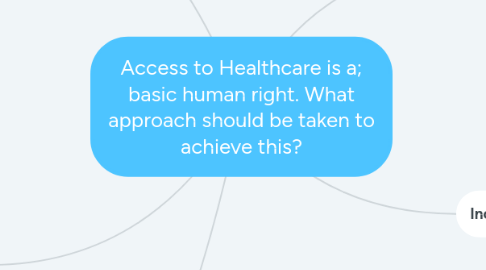
1. Increased Tax
1.1. Pros
1.1.1. This would allow the government to give more funding to the NHS and therefore would benefit this service. they could expand employees and equipment cutting wait times down and improving the overall service.
1.2. Cons
1.2.1. This may leave many people struggling to pay bills and decrease quality of life for many people in the lower income bracket. it may also be an unpopular opinion and the party that imposed this may be voted out of government.
1.3. `
2. Eliminate all licensing requirements for medical schools, hospitals, pharmacies, and medical doctors and other health-care personnel.
2.1. Their supply would almost instantly increase, prices would fall, and a greater variety of health-care services would appear on the market. Competing voluntary accreditation agencies would take the place of compulsory government licensing — if health-care providers believe that such accreditation would enhance their own reputation, and that their consumers care about reputation, and are willing to pay for it.
2.2. Because consumers would no longer be duped into believing that there is such a thing as a "national standard" of health care, they would increase their search costs and make more discriminating health-care choices.
3. Eliminate all government restrictions on the production and sale of pharmaceutical products and medical devices.
3.1. This means no more Food and Drug Administration, which presently hinders innovation and increases costs
3.2. Costs and prices would fall, and a wider variety of better products would reach the market sooner. The market would force consumers to act in accordance with their own — rather than the government's — risk assessment. And competing drug and device manufacturers and sellers, to safeguard against product liability suits as much as to attract customers, would provide increasingly better product descriptions and guarantees.
4. Encourage wealthy people to use private healthcare.
4.1. pros
4.1.1. This would allow people who can afford it to benefit from reduced wait time for things such as appointments and even operations. There are now many company's that are based all over the UK offering private healthcare.
4.2. Cons
4.2.1. People who are not using the NHS may feel that they deserve to pay less in tax due to not using the service. This may result in less tax being paid and therefore more pressure being on the NHS again.
5. Increased Technology
5.1. If the technology was updated it could lead to reduced time spent dealing with errors such as security breaches etc. It could also allow for patient-doctor interactions over the internet which could reduce doctor call out times.
5.2. Pros
5.3. Cons
5.3.1. This would of course cost the service money to updated all of the systems on an already service suffering from sufficient funding. it would also require training for staff to be able to use the new and updated systems. This would end up taking up more time and could increase pressure on the system.
